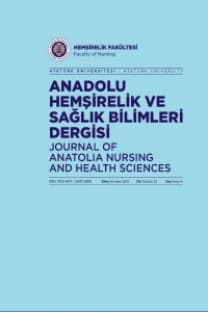KANGURU BAKIMININ PREMATÜRE BEBEK ANNELERİNİN EMZİRME ÖZYETERLİLİK DÜZEYİ VE EMZİRME BAŞARISINA ETKİSİ
THE EFFECT OF KANGAROO CARE ON BREASTFEEDING SELF-EFFICIENCY AND BREASTFEEDING SUCCESS OF PREMATURE INFANT MOTHERS
Mother, breastfeeding success, breastfeeding self-efficiency, nurse premature infant, neonatal intensive care unit,
___
- 1. Yıldırım G, Gökyıldız Ş. Sağlıklı bebeğe sahip olamayan ailelerin yaşadığı psikososyal sorunlar. Atatürk Üniversitesi Hemşirelik Yüksekokulu Dergisi 2004;7(3):74-82.
- 2. Sola C, Diken İH. Gelişimsel gerilik riski altındaki prematüre ve düşük doğum ağırlıklı çocuğa sahip annelerin gereksinimlerinin belirlenmesi. Ankara Üniversitesi Eğitim Bilimleri Fakültesi Özel Eğitim Dergisi 2008; 9(2):21-36.
- 3. Ayvaz E, Acikgoz A. A Qualitative Study: Determination of the Opinions and Expectations of the Families with Infants Treated at the Newborn Intensive Care Unit, Osmangazi Journal of Medicine, 2019;41(3):271-8.
- 4. Eras Z, Atay G, Durgut Şakrucu E, Bahar Bingöler E, Dilmen U. Yenidoğan yoğun bakım ünitesinde gelişimsel destek. Şişli Etfal Hastanesi Tıp Bülteni 2013;47(3):97-103.
- 5. Conde-Agudelo A, Belizán JM, Diaz-Rossello J. Kangaroo mother care to reduce morbidity and mortality in low birthweight infants. The Cochrane Database of Systematic Reviews 2011;16(3). http://dx.doi.org/10.1002/14651858.CD002771.
- 6. Sarıcan ES. Prematüre bebeklerde kanguru bakımının annenin emzirme durumuna ve bebeğin büyüme-gelişmesi üzerine etkisi. Atatürk Üniversitesi, Sağlık Bilimleri Enstitüsü, Ebelik Anabilim Dalı, Yükseklisans Tezi, İzmir, 2014.
- 7. Onat G. Doğal doğumdan sonra emzirmenin üç bileşeni: memeye emekleme, kanguru bakımı, biyolojik beslenme. Hemşirelikte Eğitim ve Araştırma Dergisi 2015;12(2):78-84.
- 8. Günay U, Coskun D. Kanguru Bakımı Uygulaması Başlatılan Bir Yenidoğan Yoğun Bakım Ünitesinde Yenidoğan Ekibinin Gözlem, Görüş ve Deneyimleri: Nitel Bir Araştırma. Journal of Pediatric Emergency Intensive Care Medicine 2019;6:85-90.
- 9. Johnston CC, Filion F, Campbell-Yeo M, Goulet C, Bell L et al. Enhanced Kangaroo mother-care for heel lance in preterm neonates: a crossover trial. Journal of Perinatology 2009;29(1):51-6.
- 10. Moore ER, Anderson GC, Bergman N. Early skin-to-skin contact for mothers and their healthy newborn infants. The Cochrane Database of Systematic Reviews 2012;16(5). doi: 10.1002/14651858.CD003519.pub3
- 11. Heidarzadeh M, Hosseini MG, Ershadmanesh M, Tabari MG, Khazaee S. The effect of kangaroo mother care (KMC) on breast feeding at the time of NICU discharge. Iran Red Crescent Medical Journal 2013;15(4):302-6.
- 12. Kangaroo Mother Care. (KMC) http://www.kangaroomothercare.com (ErişimTarihi: 1 Mart 2016).
- 13. Johnson AN. The maternal experience of kangaroo holding. Journal of Obstetric Gynecology & Neonatal Nursing 2007;36:568-73.
- 14. Gathwala G, Singh B, Balhara B. KMC facilitates mother baby attachment in low birth weight infants. Indian Journal of Pediatrics 2008;75(1):43-7.
- 15. Bystrova K, Ivanova V, Edhborg M, Matthiesen AS, Ransjö-Arvidson AB, Mukhamedrakhimov R. et al. Early contact versus separation: effects on mother-infant interaction one year later. Birth 2009;36(2):97-109.
- 16. Çınar N, Zengin H. Two hearts beating: the history and benefits of “Kangaroo Care”. Hektoen International Journal. 2019. https://hekint.org/2019/04/22/two-hearts-beating-the-history-and-benefits-of-kangaroo-care
- 17. Öztürk H, Demir Ü. Erken dönemde emzirmenin anne ve bebek sağlığı açısından yararları. Atatürk Üniversitesi Hemşirelik Yüksekokulu Dergisi 2001;4(2):58-62.
- 18. İşler A. Prematüre bebeklerde anne-bebek ilişkisinin başlatılmasında yenidoğan hemşirelerinin rolü. Perinatoloji Dergisi 2007;15(1):1-6.
- 19. Yenal K, Aluş Tokat M, Durgun Ozan Y, Çeçe Ö. Bakılan Abalın F. Annelerin emzirme öz yeterlilik algıları ile emzirme başarıları arasındaki ilişkinin incelenmesi. Hemşirelikte Eğitim ve Araştırma Dergisi 2013;10(2):14-9.
- 20. Dennis CL, Fauz S. Development and psychometric testing of the Breastfeeding Self-Efficacy Scale. Research in Nursing & Health 1999;22(5):399-409.
- 21. Dennis CL. The breastfeeding self-efficacy scale:psycometric assesment of the short form. Journal of Obstetric Gynecologic and Neonetal Nursing 2003; 32(6):734-44.
- 22. Akcan E, Yiğit R, Atici A. The effect of kangaroo care on pain in premature infants during invasive procedures. Turkish Journal of Pediatrics, 2009; 51(1):14-8.
- 23. Koç S, Kaya N. Doğumda kanguru bakımının sağlıklı yeni doğanların fizyolojik parametrelerine etkisi. Hemşirelikte Araştırma Geliştirme Dergisi,2017;19(1):1-13.
- 24. Adams D, Hewell S. Maternal and professional assessment of breastfeeding. Journal of Human Lactation 1997;13(4):279-83.
- 25. Demirhan F. Sakarya ilinde emzirmenin değerlendirilmesi. M.Ü. Sağlık Bilimleri Enstitüsü, Yüksek Lisans Tezi, İstanbul, 1997.
- 26. Yenal K, Okumuş H. LATCH Emzirme tanılama Ölceğinin güvenirliğini inceleyen bir calışma. Hemşirelikte Araştırma Geliştirme Dergisi 2003; 5(1):38-44.
- 27. Aluş Tokat M, Okumuş H, Dennis CL. Translation and psychometric assessment of the breast-feeding self-efficacy scale-short form among pregnant and postnatal women in Turkey. Midwifery 2010;26:(1):101-8.
- 28. Aktuğ T. Bilimsel araştırma biçimleri. Çocuk Cerrahisi Dergisi 2016;(Ek sayı 1):3-6.
- 29. Aghdas K, Talat K, Sepideh B. Effect of immediate and continuous mother–infant skin-to-skin contact on breastfeeding self-efficacy of primiparous women: A randomised control trial. Women and Birth 2014;27(1):37–40.
- 30. Küçükoğlu S, Çelebioğlu A, Coşkun A. Yenidoğan kliniğinde bebeği yatan annelerin postpartum depresyon belirtileri ve emzirme özyeterlilik düzeylerinin belirlenmesi. Gümüşhane Üniversitesi Sağlık Bilimleri Dergisi 2014;3(3):921-32.
- ISSN: 1309-5471
- Yayın Aralığı: 4
- Yayıncı: Atatürk Üniversitesi Hemşirelik Fakültesi
DÜNYA’DA VE TÜRKİYE’DE HEMŞİRELİK HİZMETLERİNDE PERFORMANS DEĞERLENDİRME
FEKAL MİKROBİYOTA TRANSPLANTASYONU VE HEMŞİRELİK
Gülistan YOLDAŞ, Aynur TÜREYEN
CERRAHİ KLİNİKLERDE ÇALIŞAN HEMŞİRELERİN HASTA GÜVENLİĞİ KÜLTÜRLERİ VE ETKİLEYEN FAKTÖRLER
Sevban ARSLAN, Nursevim AYDINGÜLÜ, Muaz GÜLŞEN, Sevgi DENİZ DOĞAN, Sevilay ERDEN
Aslihan KARAKOÇ GEÇİCİ, Emine GEÇKİL
Sibel KIYAK, Kamile ALTUNTUĞ, Emel EGE
METODOLOJİK BİR ÇALIŞMA: AKILCI İLAÇ KULLANIMI ÖLÇEĞİ’NİN GELİŞTİRİLMESİ
Vahide ÇAKMAK, Sezgi ÇINAR PAKYÜZ
Huri Seval GÖNDEREN ÇAKMAK, Emine ÖZER KÜÇÜK, Bilge BAL ÖZKAPTAN
ÜROLOJİK CERRAHİ SONRASI AĞRI YÖNETİMİNDE GÜNCEL YAKLAŞIMLAR
